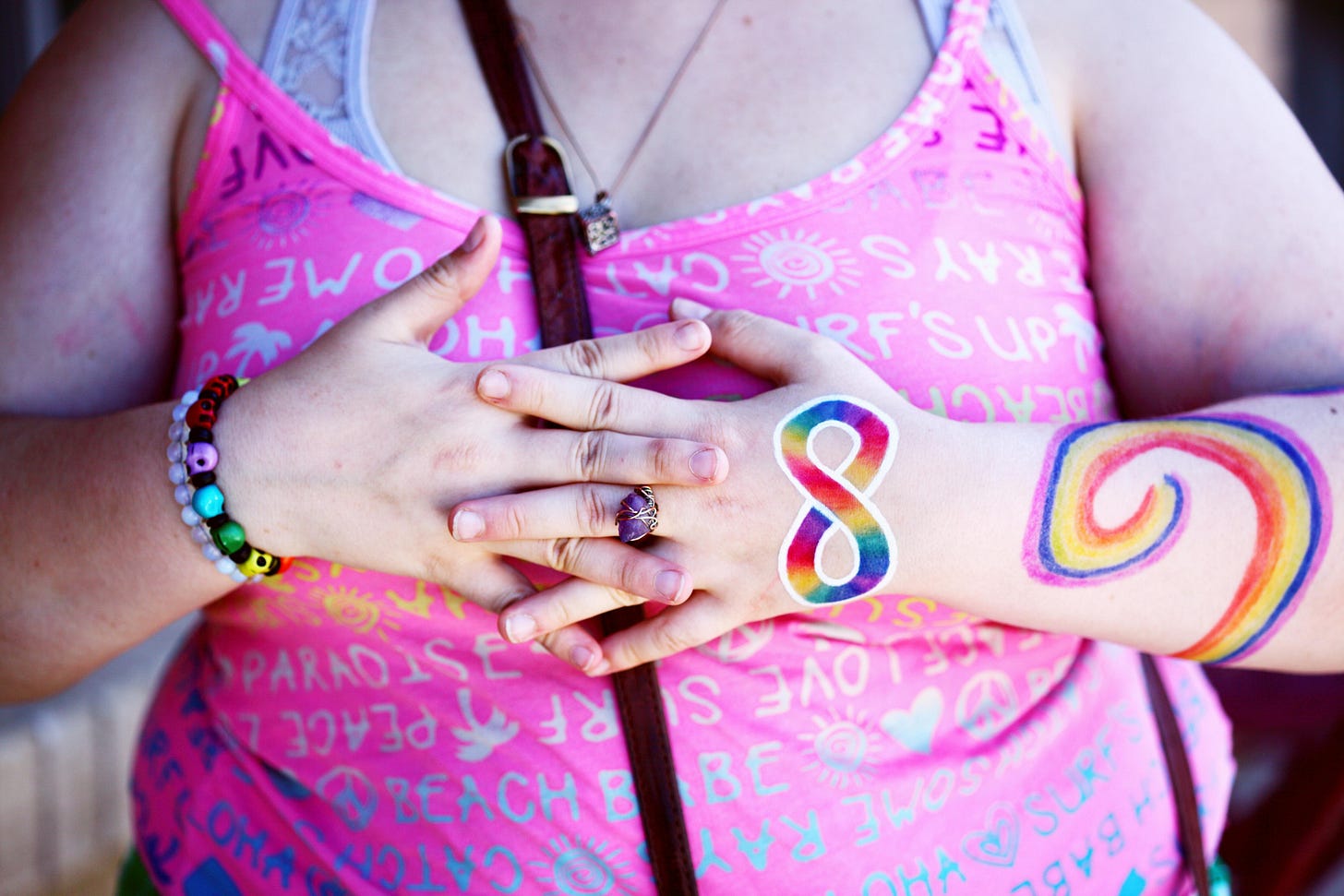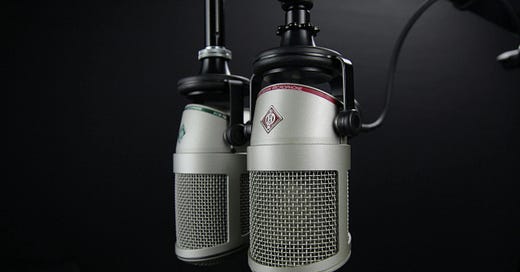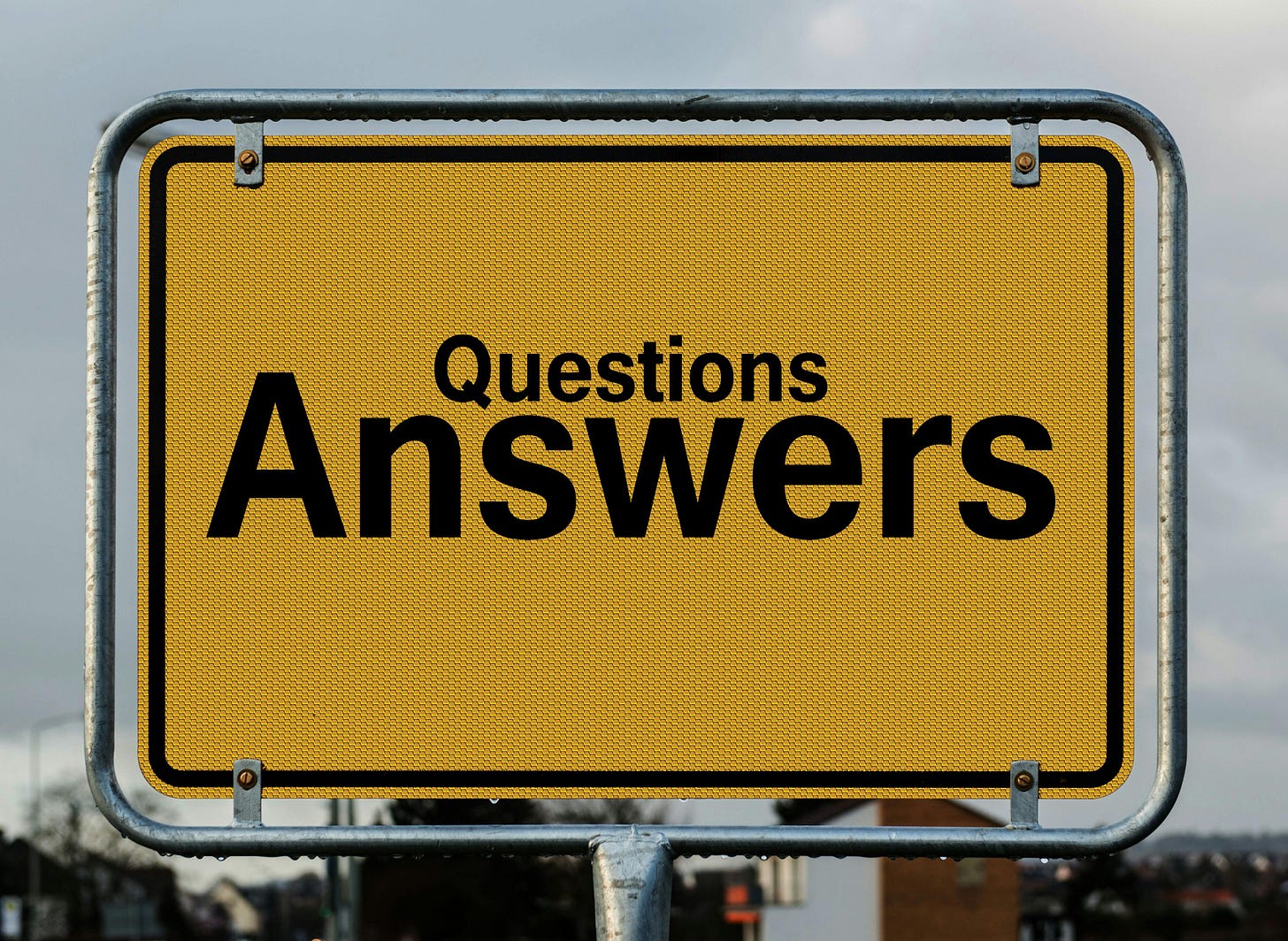Two Microphones - I Invented the #AskingAutistics Tag. Here's why:
Building Bridges: We needed a tag that would allow our allies and those who were still unsure of their Autistic Identities to chime in and ask questions.
Yesterday, I spoke about the recent history of the #ActuallyAutistic tag and what that tag meant to me as a late-diagnosed Autistic person eight years ago (when there wasn't a wealth of Autistic Bloggers and educators online yet).
I also spoke about how self-identified Autistic People were always included within the #ActuallyAutistic community because some people were unsure about that.
If you missed yesterday's piece (most of which is FREE to read), you can find it HERE.
While #ActuallyAutistic was (and continues to be) a vital connection tool for Autistic People all over the world, it's more than that. The tag (intended ONLY for Autistic People) allows us to unify our efforts to improve the world for Autistic People everywhere, giving us a virtual microphone to amplify our voices.
ActuallyAutistic has fostered a sense of unity among Autistic People like me, and countless others who would have otherwise been isolated. It has provided a platform for us to find each other, collaborate, and advance our various projects and initiatives with more cohesion than was ever possible previously.

#ActuallyAutistic has been a crucial tool for amplifying Autistic voices, it has also empowered us to share our own stories in a world that historically spoke over us. However, it's important to acknowledge that #ActuallyAutistic, like any platform, has its imperfections.
One of the challenges we face in # ActuallyAutistic, and in social media in general, is the need to amplify marginalized voices within the community.
Online the most common experiences often receive the most attention due to the way hashtags work, which can overshadow the voices of those with less visibility. It's crucial to recognize that this is a social media problem, not specific to the #ActuallyAutistic hashtag.
Social media tends to share content with people it perceives to have similar experiences and beliefs.
If you have a marginalized identity, the algorithm may see you as having 'less in common' with many platform users, resulting in less distribution of your posts. This can lead to your experiences being deemed 'irrelevant' to many users, further marginalizing your voice.
Similar happens in online Queer spaces and other NeuroDivergent spaces I'm in.
In Queer spaces, they often forget to be intersectional, ESPECIALLY around disability status, NeuroDivergence, and income.
While in NeuroDivergent communities, on the other hand, we pay better attention to the issues of poverty, disability status, but we don't always do so well taking considerations around Queer inclusion or the impact racism has on NeuroDivergent experiences.
#ActuallyAutistic was a great starting point for our community.
This tag is still essential because it is a first step for many community members (and potential allies) to listen to and learn from Autistic voices about Autism and the Autistic experience. However, we need to strive for a more inclusive and supportive online community, where everyone's voice is heard and respected.
Step one for an outsider wanting to help a community they're not a part of is to be quiet and listen (without trying to express their feelings and opinions about that group).
Many people struggle with holding their tongue when confronted with new information they don't yet understand - Especially if it challenges things they’ve been taught from a young age.
Early in the journey, potential allies need to understand the importance of listening and learning and being quiet sometimes. Only by doing so can they learn better ways to engage and support marginalized communities (without causing more harm).
Eventually, once potential allies have done enough work educating themselves about engaging with a marginalized group without perpetuating harm, they can start asking questions (when and if there is an appropriate forum to do so).
Unfortunately, eight years ago, when I was just learning about my own Autism diagnosis, the online Autistic Community didn't have such a forum... yet.
Two Microphones
ActuallyAutistic was a significant step forward as it gave Autistic People a "microphone" on multiple social media channels. However, as I observed the discussions within various online Autistic Community spaces, it became clear that having two "microphones," not just one, could significantly amplify the Autistic Human Rights Movement.
We needed a tag that would allow our allies and those who were still unsure of their Autistic Identities (and didn't feel comfortable saying they were Autistic yet) to chime in and ask questions.
Half-Priced Low-Income Subscription Available
If you are in need of a discount, please use the link below to get your subscription at a deep discount (because I don't want money to be an obstacle to people):
https://neurodivergentrebel.substack.com/LowIncomeDiscount
For readers experiencing financial hardship, please note that this offer is exclusively for you. This discount is offered on the “honors system” - I am not going to ask anyone for proof.
Please, kindly refrain from taking this offer if you do not need it.
I hope this helps,
- Lyric
Many self-identified Autistics did (and still do) use #ActuallyAutistic for themselves.
While #ActuallyAutistic wasn't (and isn't) an "anti-self-identification tag," due to its nature of being the ONLY hashtag exclusively for Autistic People, it didn't leave room for non-autistics and people who don't see themselves as Autistic to ask a bunch of questions, flooding the feed, making it hard for Autistic People to find one another.
In addition to being Autistic (and multiply NeuroDivergent), I am also Queer (in multiple ways), so I often compare my NeuroDivergent and Queer experience (also known as NeuroQueering).
Thanks to this habit of NeuroQueering (even before I knew there was a word for it), I was keenly aware that the Autistic Community, like all communities, needed allies, and our current microphone setup (where we didn't allow potential allies to speak and ask questions) was holding us back.
Yes, Autistic People needed (and still need) a metaphorical social media microphone - because we're a marginalized group of people.
We needed a microphone because non-autistic people (who weren't listening to us) were intent on speaking over us about what we felt we needed to live happy, authentic lives (because they thought we, as Autistic People could not know what's best for ourselves because “our Autism prevented us from understanding things” their way-ignoring how Autistic People understand things in our own way).
When working together, #ActuallyAutistic was louder than even giants like Autism $queaks. We turned up the volume and "shouted over" the people speaking over us for years, and finally, we were heard.
We were heard, people started to listen, and we began to gain allies—allies who wanted to learn and ask questions but needed to know how because we had not set aside a microphone, making space for them... yet.
Our allies were stuck, waiting to be let in, needing an invitation and a bridge to get them to our side (the NeuroInclusive side) of a great divide.
Seeing this need and how many potential allies (and yet to be discovered Autistic People) were "stuck" without a safe bridge to enter the online Autistic Community, I created a second hashtag, #AskingAutistics, to be that bridge (on Twitter before it became a n4zi trash fire).
#AskingAutistics is a hashtag for ANYONE (regardless of brain type) who wants to ask Autistic People a question.
Many people who are Autistic, suspect they are Autistic, allies, and those who care about the well-being of Autistic People use this tag every day (across multiple social media platforms) to ask for Autistic input and opinions on topics and subjects relevant to Autistic life.
#AskingAutistics is the companion tag for #ActuallyAutistic, made to ensure we (and the people who genuinely want to understand us) are invited into a space where curiosity is welcome and encouraged.
Just like #ActuallyAutistic, when we use the tag #AskingAutistics, looking for Autistic input, that input should include self-identified Autistic People - I say that as the creator of the #AskingAutistics tag.
Thanks for coming to this little Autistic Rights History moment.






